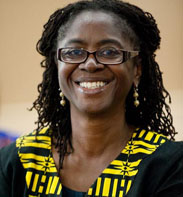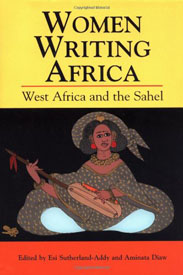For chair of Women’s and Gender Studies, ‘Women Writing Africa’ presented a professional and personal challenge

Through dirges and lullabies, through work songs, legal depositions and political poetry, a ground-breaking series of books is bringing African women’s voices to life.
Women Writing Africa, a four-volume collaboration published by the Feminist Press at the City University of New York, includes contributions from almost 50 countries on the vast continent, translated from more than 40 languages.
Among those who directed the two decades-long project is Abena P.A. Busia, a longtime Rutgers professor who last year took over the helm of the School of Arts and Sciences' Women’s and Gender Studies Department – and who is herself a daughter of Africa.
“The common thread is that African women are not silent, are not only pregnant and barefoot, that they have been fully involved in their communities, in politics and in education,” says Busia. “Running through all of these pieces is an increasing awareness of what it means to be an African woman in the new world.”
The 20-year labor of love was at once professionally challenging and intensely personal for Busia, whose father, Professor Kofi Abrefa Busia, served as prime minister of Ghana from 1969 to 1972, a time of great turmoil for the West African nation.
The Rutgers scholar recalls living under house arrest or in exile for a large chunk of her childhood; she remembers waking to the sound of gunfire during political unrest. Overthrown in a coup d’état in 1972, Kofi Busia ultimately died in exile in 1978, shortly before his daughter started graduate school at Oxford.
Among other distinctions, the elder Busia was the first African to occupy a chair at the University of the Gold Coast and the first African student at University College at Oxford.
In the early 1990s, when Abena Busia was invited to join a small group of academics and activists exploring what would ultimately become a massive literary undertaking, the fit felt right.

Among those convening those early meetings was another name that would later become familiar at Rutgers. Alison R. Bernstein, formerly a vice president of the Ford Foundation and now director of the university’s Institute for Women’s Leadership, was instrumental in securing a grant from the foundation to launch the series.
Busia, whose credits include serving as a president of the African Literature Association as well as the Association for the Study of the Worldwide African Diaspora, says compiling the volumes involved an intense and often heated series of debates: Who is an African woman? Should we include women living in the African Diaspora? What about women of European descent? The wives of missionaries? And what constitutes writing, anyway?
“One of the South African committee members said we have just come out of a decades-long struggle for a non-racist South Africa – we cannot endorse exclusion, we cannot do what others have done to us,” Busia says.
With that in mind, the anthologists ultimately chose the route of greatest inclusion: praise poems, songs and other representations of the oral tradition, as well as letters, journals and historical documents fill the volumes’ pages.
Thus series readers will encounter a marriage proposal to an ancient Egyptian queen, a 1711 letter by a woman who ruled a large Muslim domain and a memoir by a Mau Mau general.
For each of the hundreds of entries, the authors have provided extensive notes, detailing not only an item’s provenance but also its context and the background of its author. Each book represents a wide geographical region, with Busia also serving as associate editor on the volumes covering North Africa and West Africa and the Sahel, the swath of land between the Sahara Desert in the north and the savannas of Sudan in the south.
Overall, the project was fraught with difficulty, Busia remembers, much of it driven by shifting political winds.
Turbulence in Central Africa kept scholars away and limited access to material, for example. The undertaking also created a demanding travel schedule: Among other nations, Busia visited Egypt, Morocco, Algeria and Tunisia, Nigeria, Mali, Senegal, Cote d’Ivoire, South Africa and Ghana during the course of its completion.
All the while, the Rutgers academic was carrying out her own research as well as turning out such books as Theorizing Black Feminisms and the poetry collections Testimonies of Exile and Traces of a Life. She also has served on the board of the Ghana Education Project, which works to improve education, training and infrastructure in the country of her birth, and on the board of the African Women’s Development Fund, a pan-African funding source for women-centered programs and organizations.